Five magnificent websites for intermediate level students of English
This time around, I explore five magnificent websites for intermediate level students of English.
The vast majority of students that contact me are intermediate level speakers.
I immediately set about demonstrating some of the most effective language learning strategies to new students. The aim of these strategies is to help them develop their spoken competence. One of the most prominent strategies I like to show students is PELC’S Word-Phrase Table.
The next step I take is to introduce them to what I think are the most linguistically rich websites for intermediate level students to explore. These sites include:
1. Deep English
2. Ted talks
3. BBC articles
4. psychologytoday.com
5. BBC Learning English: 6 Minute English
Let’s dive in to consider what these digital resources can offer intermediate level learners.
1. DEEP ENGLISH
Why are Deep English texts so useful for intermediate level learners?
At the time of updating this post, Deep English has released 632 free lessons. These texts tend to be carefully abridged accounts of surprising and controversial stories in the news.
Deep English texts primarily appeal to learners at the lower, mid and upper intermediate levels. Nevertheless, there have always been enough challenging structures, idioms and lexis in the texts to interest advanced level learners. Indeed, the vocabulary and phrases in bold font in each text are clearly oriented towards advanced level learners. The word ‘Advanced’ in the drop down definitions section in the left sidebar proves this assertion:
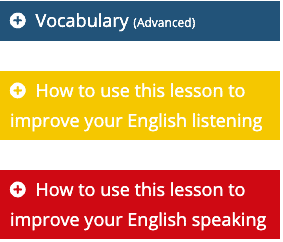
One of my favourite lessons is about “bucket lists”. A bucket list is a collection of experiences, goals and adventures people would like to accomplish before they die. In this text, there are plenty of phrases for intermediate level learners to add to their Word-Phrase Tables and vocabulary notebooks. These include:
- a common English expression
- get mixed reviews
- struck a chord with people
- get arrested
- do hard time
- be diagnosed with cancer
- hit the road
- terminally ill
One of the standout features of Deep English texts has always been the provision of audio. Each text is supplemented with three different audio speeds to boost learners’ listening comprehension.
A recent revolution
The standout features of Deep English texts mentioned in the previous section certainly apply to lessons 1 through 435.
However, Deep English introduced a massive change to the way it organises texts from lesson number 436. Namely, each story now has two versions - a “Breakthrough” lesson and an “Advanced” lesson. Each version still retains audio files at three different speeds.

As Deep English confirms: “Breakthrough lessons are a stepping stone to our more difficult Advanced lessons. After you have listened to this version several times, challenge yourself with the Advanced version”.
Overall, intermediate level learners now have the best of both worlds. For each text, they can study the more manageable Breakthrough version. Thereafter, they can challenge themselves with the Advanced version.
A word of warning
Deep English only keeps the 20 most recent lessons on the site. Therefore, it’s advisable to bookmark lessons or store the links in a safe place.
2. TED TALKS - IDEAL FOR AN ALL-ROUND ENGLISH LANGUAGE LEARNING EXPERIENCE
When it comes to the best digital resources and websites for intermediate level students, TED talks must be right up there.
I’ve been using TED talks with my intermediate students for over five years. I’ve got links to roughly 170 talks which I believe can get students talking.
The sheer range of Ted Talks
Looking at the first ten Ted talks in my list, the wide variety of themes available for discussion is very apparent.
The first TED talk I ever analysed was chef Jamie Oliver’s tirade on humanity's ignorance of food. In this talk, Jamie shared shocking stories from his anti-obesity project in the American city of Huntingdon, West Virginia.
After Jamie, I got my students to watch one of TED’s most popular talks by creativity expert Sir Ken Robinson. In this talk, Ken questions the way children are educated. He challenges the hierarchical structure of school subjects, whereby the humanities are favoured over the arts. Ken also champions to need to nurture creativity and recognise multiple types of intelligence.
Other talks in my list include Sam Bern’s “My philosophy for a happy life”, and Lidia Yuknavitch’s “The beauty of being a misfit”.
All in all, I am careful to share only thought-provoking talks with my students. If a talk evokes some powerful emotions in them, then this can only aid the language learning process. First of all, they’re more likely to listen to a provocative talk over and over again. Secondly, there is a greater chance they’ll have a lot to say in the discussion phase as they're likely to feel the need to let out their emotions.
How can teachers help students to get the most out of TED talks?
There are certain steps that teachers can take to help their students gain maximum benefit from TED talks:
1. Listen for gist
Those with a solid command of English should refrain from relying on the English or first language Transcripts. Of course, few students are going to understand everything on the first or second listening. However, it’s vital for students to try to catch the main ideas without understanding all the words and sentences. Listening for gist is a skill worth honing.
Essentially, listening for gist revolves around attempting to pick up key words, intonation and other clues, so as to make a guess at the meaning.
2. Listen and read along with the English transcript
On the third or fourth listening, students may listen to the talk and read along with the transcript simultaneously.
In this way, they can stop and start the talk when necessary and use dictionaries to check new vocabulary. Moreover, they can note down any questions if they need their teacher to clarify any language points.
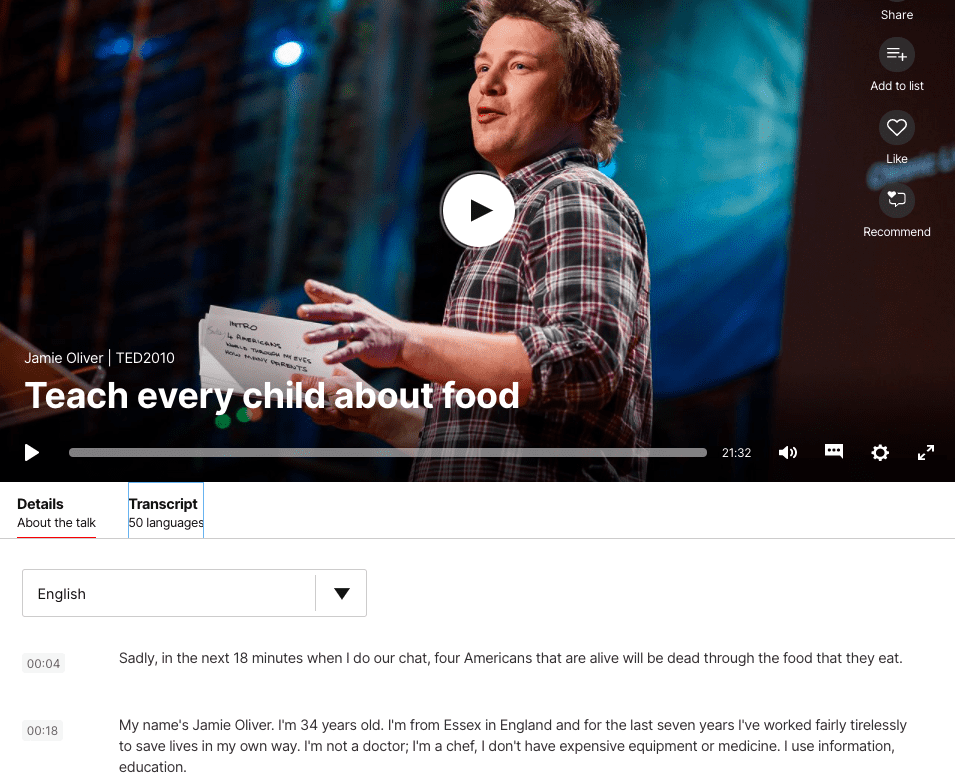
3. Class time - The language consideration stage
Before the discussion stage, teachers may present a list of sentences to students containing useful words and phrases. I wrote about this 'language consideration stage' in my previous post about how to plan a language learning class.
Hence, I pick out sentences from the transcript and present them to students in the following way:
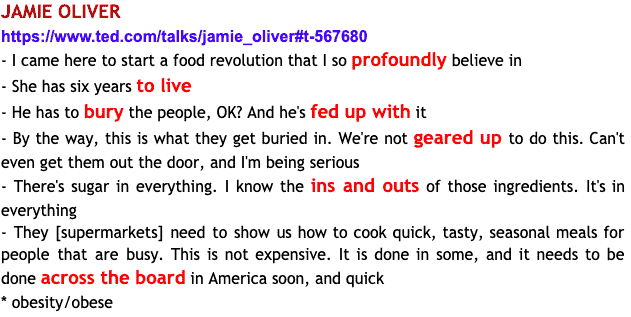
I emphasise key words and phrases in red colour. When necessary, I get my students to define these words and phrases or ask them to provide synonyms.
After the lesson ends, I forward a list of definitions for the words and phrases to students.
4. Pronunciation and intonation work
TED talk speakers tend to be very expressive, using colourful language and a range of intonation patterns. Therefore, it can be fruitful to get students to read selected sections from a transcript. Alternatively, teachers can model chosen sections or sentences for students to repeat the intonation and pronunciation.
5. Conversation
There’s no doubt about it - TED talks get students talking.
From Jamie Oliver’s TED talk, I have ten discussion points to refer to in case students are lost for words.
These discussion points include:
- Whether parents are to blame for blessing children “with the destiny of a shorter lifespan”
- Changes in the quality of food over the years, i.e. an increased reliance on processed foods
- The quality of school food
- Teaching children about diet during class time
- Life skills. Making sure that kids leave school knowing how to cook ten recipes “that will save their life”
- The role of supermarkets - labelling packaging etc.
- Meals in the workplace
Overall, I focus on discussion points which ensure students speak up and don’t feel inhibited from stating their opinions. Importantly, I encourage them to bring their own life experience into their answers.
3. BBC ARTICLES - VaRIETY IS THE SPICE OF LIFE
I’ve been using articles with students from BBC.com since 2013.
In fact, the first thirteen articles I used with students when I started teaching online were from BBC.com. The majority of these articles were from BBC Capital - now known as Business. I also found a few great articles in the BBC Future section when I started out.
BBC articles get students talking
The very first article I used as an online teacher was about how ideas become viable businesses.
BBC Worklife articles tend to raise many great points for discussion. The article about viable businesses prompted me to explore the following themes with students:
- Defining what a ‘viable business’ is;
- How to turn a vision into a viable business;
- The importance of being comfortable with the worst-case scenario when setting up a business;
- The importance of teaming up with people who can bring different skills to the table;
- Why it’s important to start a company related to a field that is also one’s passion;
- The value of being patient. Success rarely comes within three years;
- How some people have lost it all - family and everything - due to their deluded beliefs in the viability of their business venture;
I purposely search for articles and themes which I’m sure my students will feel comfortable sharing their experiences about.
The second BBC article I used as on online teacher debates whether there is such a thing as a work-life balance. Naturally, this topic is particularly straightforward for students to share their opinions about. This is because they spend so much time trying to attain a balance between work and life. Hence, achieving a work-life balance is a thorny issue, likely to stir people's emotions.
This article encourages students to speak about:
- Whether a work-life balance actually exists in this day and age. Is it all just life?;
- The most defining moment of their day. What’s the first information they expose their brain to? Do they reach for their Smartphones as soon as they wake up? Have they ever mediated, exercised or wrote in a diary before opening the digital floodgates?;
- How do they control the continual bombardment of alerts and notifications on their Smartphones?;
- Unread emails - Do they cause stress after a long workday?;
- Checking phones in social situations - What do they feel about people who check their phones whilst having dinner with others in a restaurant?
Building one’s vocabulary and repertoire of collocations with BBC articles
Returning to the article about viable businesses, let’s consider some of the words and phrases I highlighted for students:
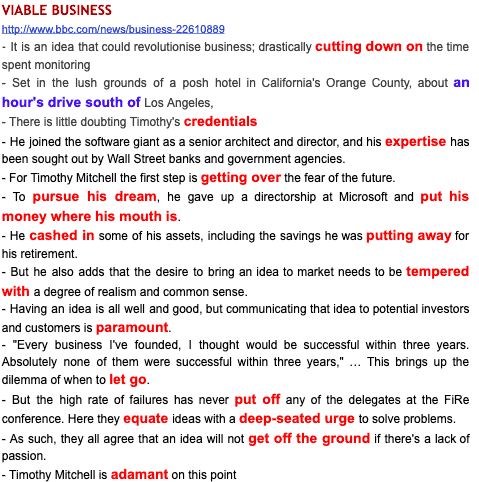
All in all, there’s some really valuable work/business-related language here. For example:
- credentials (background; experience);
- pursue a dream;
- expertise (noun);
- get (a business / business idea) off the ground (when a business starts to succeed).
Moreover, many useful phrasal verbs can be found in BBC articles. In the sentences in the screenshot above, the following phrasal verbs appear:
- cut down ON something (reduce)
- get over (overcome)
- cash in (exchange something for money)
- put off (discourage)
- put away (save money)
Other phrasal verbs in this article which I didn’t include in the list above include turn into (become - turn an idea into an effective business) and go back (go back to work).
Quotations, interviews and expert knowledge
Another advantageous trait of BBC articles is their tendency to include contributions from experts or quotations from interviews. Have a look at this short extract from the article about viable businesses:

Of course, quotations contain more natural spoken language features than regular descriptive journalism. As you can see in the quotation above, the subject uses natural spoken language features such as contractions (you’re and I’ve), and short sentences without a verb (Family and everything). There’s also some idiomatic language. For example, put food on the table means to provide enough money to cover the basic necessities a person needs to survive.
Covering so many BBC articles allows for the repetition of vocabulary, phrasal verbs and collocations
I’m sure that I have covered a few hundred BBC articles with some of my long-term students.
Many of the articles adhere to a similar format and are written in a fairly similar style. Moreover, many of the work-related articles have overlapping themes. This means that the same vocabulary, phrasal verbs and collocations pop up in different articles. Such repetition is certainly beneficial when it comes to a student’s acquisition of the English language.
______
With regard to digital resources and websites for intermediate level students, BBC news articles are a teacher’s dream. Students are invariably able to relate their own work-life circumstances to the content. Finally, articles from sections such as BBC Future and BBC Tech not only offer students a thorough English language workout, but an intriguing educational experience as well.
4. PSYCHOLOGY TODAY - INTRIGUING ARTICLES FOR INTERMEDIATE STUDENTS
I didn’t discover Psychology Today for its fascinating articles until about six months after I started teaching students online.
One of the most appealing traits of articles on Psychology Today is that many of them are written in the first person (with 'I'). This helps students of English to really become engrossed in a writer’s personal experiences and true stories. On a similar note, read all about how I write my own texts to inspire students.
I thoroughly believe in the power of directly transferring sentences which contain the pronoun ‘I’ to one’s individual Word-Phrase Table. Ideally, these sentences should contain a target word or phrase to learn. However, the Word-Phrase Table can still store sentences which are meaningful for a student without a target word or phrase.
Articles on Psychology Today generate fascinating discussion with intermediate level students. Some of the first articles I used with students include Azadeh Aalai’s account of quitting social media cold turkey. Another article I found is Alex Lickerman’s post about the pros and cons of sticking religiously to routine.
5. BBC LEARNING ENGLISH: 6 MINUTE ENGLISH - SHORT AND SHARP BITE-SIZED LEARNING FOR INTERMEDIATE STUDENTS
BBC 6 Minute English is a long-running series of topical discussion stretching back to 2013.
Despite the rehearsed nature of the episodes, BBC 6 Minute English offers some useful listening practice and the opportunity to pick up plenty of vocabulary.
One of my favourite episodes deals with the question: Is being thrifty a virtue?
‘Thrift’ refers to living a simple life without the need to constantly buy the latest products.
For such a short programme, there is a decent stock of vocabulary, phrases and even idioms to focus on. Have a look:
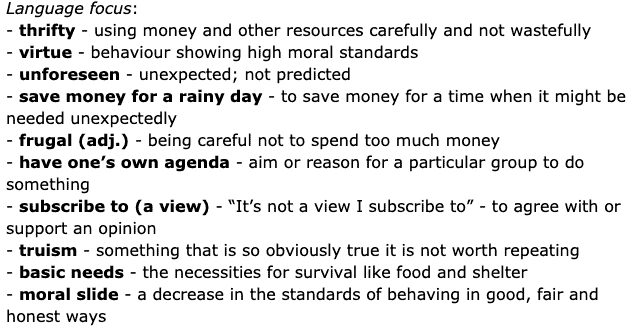
The presenters recap key words and phrases at the end of each programme. In my view, this is the most appealing feature of the series. Check out how the presenters review the vocabulary and phrases from our target episode in the screenshot below:
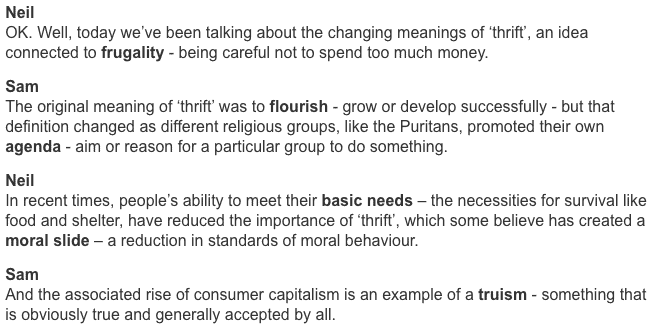
Out of all the digital resources and websites for intermediate level students of English, BBC 6 Minute English is one of the most efficient when it comes to boosting knowledge of vocabulary and collocations.
CONCLUDING THOUGHTS - WEBSITES FOR INTERMEDIATE STUDENTS OF ENGLISH THAT MAKE A DIFFERENCE TO THEIR LIVES
Regarding websites for intermediate level students, I’ve really found a comfort zone when it comes to planning classes.
The websites I recommend in this post are full of intriguing and lexically-rich materials.
It’s vital for teachers to intellectually stimulate their students.
After all, language teaching is not all about explaining grammar rules and dishing out gap-fill exercises.
Finally, I'm adamant that all of the above-mentioned websites for intermediate level students possess all the linguistic resources for them to go from intermediate to advanced level. This also depends on the language learning strategies they have in place as well to get the most out of the language they encounter.



